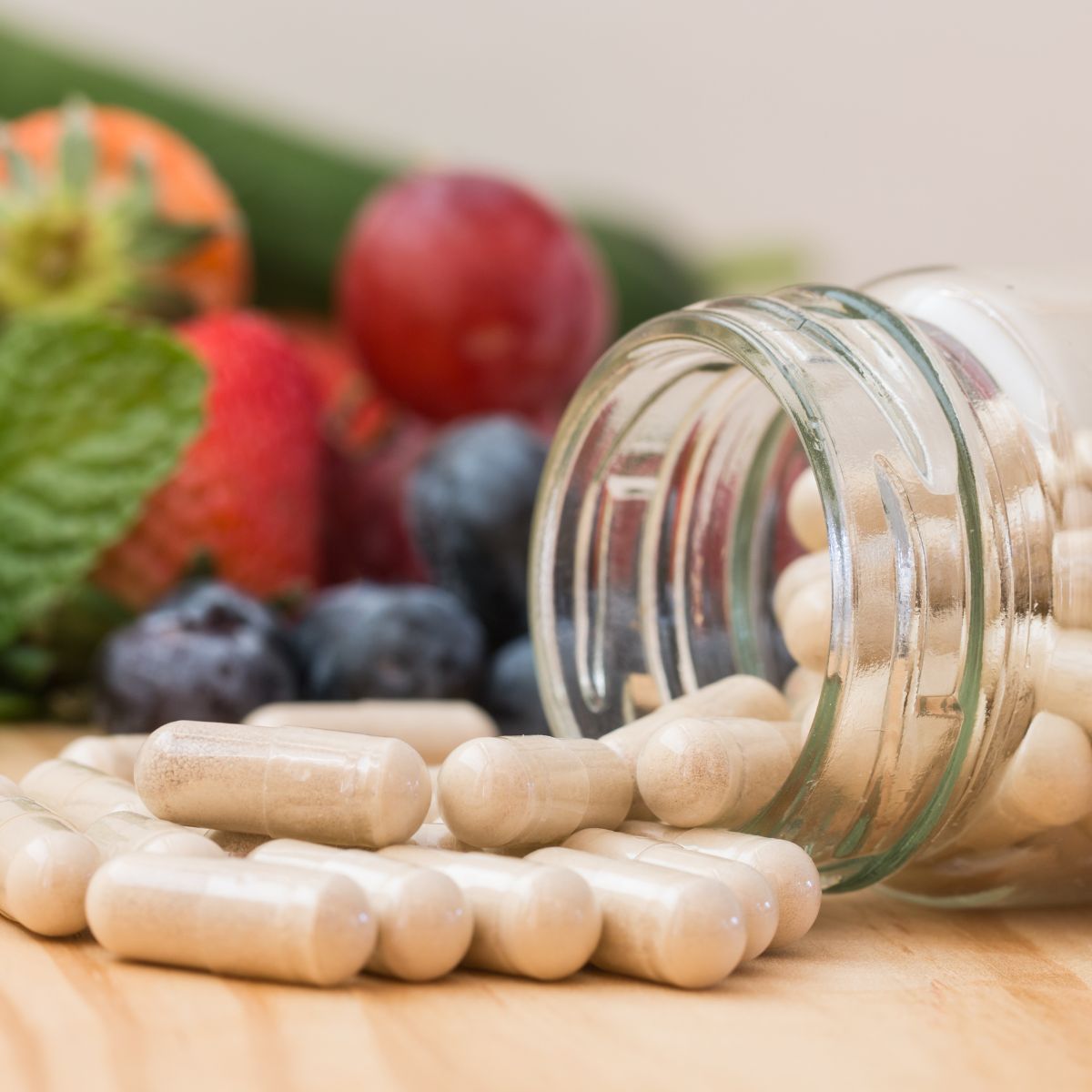

Vitamin B12 can be a source of anxiety for people interested in a plant-based diet; we all want to ensure we are getting enough of everything, and vitamin B12 is a legitimate concern for exclusively plant-based eaters. It’s one of the most common topics I’m asked about.
Because it’s such a common concern, I reviewed the literature on B12 while writing The Campbell Plan. In that book I discuss B12, supplements in general, and other topics relevant to people transitioning to a plant-based diet. I explain in the book that B12 need not cause anxiety once you know the essential details about the vitamin and how to get enough.
Here I will cover the basics. This is my interpretation of the evidence for general knowledge and should not be taken as medical advice. Many clinical scenarios might alter the advice below. Please discuss this with your doctor.
1. How is B12 made?
B12 is made by anaerobic microorganisms (bacteria that do not require oxygen to live), which are common in the gastrointestinal tract of animals.[1]

2. What foods might naturally contain B12?
Animal foods, including meat, milk, and eggs, contain B12 and are essentially the exclusive source of the vitamin in the American food supply, not counting supplements or fortification.
Two varieties of edible algae, dried green seaweed and purple seaweed, have some active B12; other algae have inactive B12-analog compounds that have no apparent benefit in animal metabolism.[2] Some mushroom varieties and some foods made with certain fermentation processes also have miniscule amounts of active B12. Otherwise, the foods found in a typical plant-based diet do not contain B12, though plants grown in experimental settings with B12-enriched soils or water (with hydroponic processes, for example) take up B12.
3. How do animals get B12?
Ruminants like cows and sheep can absorb the B12 made by their gut bacteria. Otherwise, animals get B12 by consuming food with bacterial contamination, eating animal-sourced foods, or eating poop (coprophagy, the eating of feces, is not uncommon in animals, including rodents). Please don’t get any bright ideas from this final item—there are other ways to get B12!
4. I don’t eat my poop or anyone else’s. How do I get B12?
I’m pleased with your hygiene choices.
But if you don’t eat animal-sourced foods, you aren’t getting B12 except through foods artificially fortified with B12 (nondairy milks, cereals, etc.), which is potentially insufficient. I mentioned above that a few plants or fermented foods may have B12, but these are generally unreliable B12 sources for the average person.
This is why I recommend supplementation for people with a reduced intake of animal foods.

5. Who is at risk for B12 deficiency?
In addition to people with a lower intake of animal foods, adults over 50 with atrophic gastritis, a condition in which the stomach doesn’t make as much acid, may not effectively absorb B12. This condition accounts for the majority of deficiency in older adults.[3] Because atrophic gastritis may be relatively common, the National Institutes of Health recommends a B12 supplement or fortified foods for all adults over 50, regardless of diet.[4]
Many other conditions can predispose someone to B12 absorption problems: celiac disease, Crohn’s disease, pancreas dysfunction, history of bowel or stomach surgery, and others. People with prolonged use of certain medications, including heartburn medicines such as proton pump inhibitors (e.g., omeprazole, pantoprazole), H2 blockers (e.g., ranitidine, famotidine, cimetidine), and metformin (the common diabetes drug), are also more susceptible to B12 deficiency.[5]
6. I don’t eat animal foods. How much B12 should I take?
For the general adult population, a daily dose of the smallest available tablet of B12 is more than sufficient. Recently, there has been some evidence that large supplemental doses may be associated with an increase in cancer risk in some groups.[6] Because of these findings and because I can’t find plain B12 supplements smaller than 500 mcg per pill, I’ve been recommending people take a multivitamin.
This is a relatively recent change in my clinical practice. In the study I mentioned, there was an increased risk of cancer in users of isolated B12 supplements but not of multivitamins. Generally, multivitamins have a lower dose of B12, and though I’m only guessing, I think it is probably better to supplement regularly with low doses than take isolated megadoses less frequently. If you can find a multivitamin for which two tablets or capsules equals one dose, even better! Just take one tablet or capsule (in other words, half the multivitamin dose).
Let me be clear, though: a multivitamin will not prevent or treat a chronic disease, increase your general well-being if you are healthy, or replace the health value of whole foods. This final point is most important. You should absolutely not consider a multivitamin or any other vitamin a replacement for healthy whole foods. You’re just looking for minimum levels to prevent B12 deficiency. (Learn more about supplements in general and CNS’s recommendations.)
We only need about 2.4 mcg of B12 daily, so choose a multivitamin with a low level (perhaps 10–20 mcg) and relatively low levels of everything else. Alternatively, you can intermittently take the smallest B12 dose you can find, perhaps a couple of times a week, and have your blood levels checked to confirm it is sufficient. But don’t take a single large dose and expect to be loaded up for the next six months. Based on the research I’ve seen, it seems best to take something at least weekly because your body will absorb only a small amount and excrete the rest. The reason for this low absorption is that there is only enough intrinsic factor (the body’s chemical that shuttles B12 into your gut cells) excreted per meal to absorb 2–4 micrograms of B12. Your body also absorbs B12 passively, but only perhaps 1 percent of the total dose you consume, with the percentage decreasing with higher doses.
I suggest a dose just high enough to give you a low-average level of B12. I do not suggest B12 for anything other than to prevent deficiency. Those with existing deficiencies or absorption problems may need significantly higher doses. Please discuss this with your doctor.
7. What form of B12 should I take?
I don’t advise a particular form. Both cyanocobalamin and methylcobalamin have been shown to increase B12 levels. If you have seen primary research suggesting a different interpretation, please let me know.
If you are concerned with deficiency or maximizing absorption, chewable or dissolvable tablets are much better absorbed. As discussed in my smoothie article that generated lots of lively debate, very important digestion starts in the mouth. This is another example.
8. Should I get my blood levels checked?
If you are an exclusively plant-based eater, I suggest you check your B12 level every few years, particularly if you don’t regularly take a supplement. I also recommend checking your methylmalonic acid (MMA) level, which is more specific for testing if you have enough active B12. Both are simple blood tests.
I know of no database of studies that conclusively compares checking B12 yearly versus every five years—like all the other suggestions in this article, this recommendation is based on my interpretation of the information I’ve seen.
9. Should I take extra B12 for mega-energy or superior functioning?
No. See number six above: you should not consider a B12 supplement a method for supercharging your health. I’m not aware of any evidence that B12 supplementation does more than prevent deficiency.
10. What problems does B12 deficiency cause?
It classically causes a type of anemia (megaloblastic) and a neurological disorder (subacute combined degeneration). These are real health concerns. Multiple case reports in the literature show people, including young children, suffering from permanent neurologic damage because of B12 deficiency.
Symptoms of megaloblastic anemia include fatigue, weakness, weight loss, and sore tongue; symptoms of subacute combined degeneration include numbness and tingling of hands and feet, memory changes, poor balance, and depression.
Finally, infants can suffer from developmental delay and failure to thrive. (As an aside, these problems are much more frequently caused by other things.)

11. When should I start supplementing a child who isn’t consuming animal foods?
First of all, congratulations on making an excellent health choice for your child.
I suggest all infants be exclusively breastfed for the first six months and that mom take a daily supplement so her breast milk has B12.[7] If you use formulas, they should contain B12.
Once your baby stops getting a large portion of calories from breast milk or formula—perhaps at age one, but this depends on your circumstance, so consult with your child’s pediatrician—it is probably worth supplementing. I suggest taking the smallest dose of B12 you can find, smashing it into an even smaller amount, and adding that to your baby’s food. Many foods are fortified with B12, which may be sufficient but will require more careful monitoring.
(Learn more about raising plant-based children.)
12. Does our B12 requirement mean we aren’t pure herbivores?
At the risk of inciting ideological responses, I believe it’s clear that humans did not evolve as strict vegans. Our requirement for B12 supports this point of view. From what we currently know, we evolved in an environment of scarcity and adapted to do quite well with a wide range of foods.
That said, I believe it’s also clear that we evolved as primarily plant-eaters, and we remain close genetic relatives to plant-eating primates. Modern nutritional science has shown that a dietary pattern dominated by unrefined plants—even diets exclusively containing plants—is superior for preventing and reversing chronic disease. In other words, although we perhaps evolved to eat some insects, dirt, or meat, we no longer need to; in our current environment of overabundance and profoundly sedentary lifestyles, continuing to consume insects, dirt, and meat, merely for our B12 requirements, would do more harm than good.
Might discoveries about the gut microbiome change the conversation about B12? I’m not sure, but I sure hope so.
References
- Watanabe F, Bito T. Vitamin B12 sources and microbial interaction. Exp Biol Med (Maywood). 2018;243(2):148-158. doi:10.1177/1535370217746612
- Watanabe F, Yabuta Y, Bito T, Teng F. Vitamin B₁₂-containing plant food sources for vegetarians. Nutrients. 2014;6(5):1861-1873. Published 2014 May 5. doi:10.3390/nu6051861
- Cavalcoli F, Zilli A, Conte D, Massironi S. Micronutrient deficiencies in patients with chronic atrophic autoimmune gastritis: A review. World J Gastroenterol. 2017;23(4):563-572. doi:10.3748/wjg.v23.i4.563
- National Institutes of Health (NIH) Office of Dietary Supplements. Vitamin B12 fact sheet for consumers. Updated December 15, 2023. Accessed March 14, 2024. https://ods.od.nih.gov/factsheets/VitaminB12-Consumer/#:~:text=Many%20older%20adults%20don%27t,vitamin%20B12%20from%20these%20sources
- Cleveland Clinic. Vitamin B12 deficiency. Accessed March 14, 2024. https://my.clevelandclinic.org/health/diseases/22831-vitamin-b12-deficiency
- Brasky TM, White E, Chen CL. Long-Term, Supplemental, One-Carbon Metabolism-Related Vitamin B Use in Relation to Lung Cancer Risk in the Vitamins and Lifestyle (VITAL) Cohort. J Clin Oncol. 2017;35(30):3440-3448. doi:10.1200/JCO.2017.72.7735
- Drugs and Lactation Database (LactMed®) [Internet]. Bethesda (MD): National Institute of Child Health and Human Development; 2006-. Vitamin B12. [Updated 2024 Feb 15]. Available from: https://www.ncbi.nlm.nih.gov/books/NBK534419/
Copyright 2026 Center for Nutrition Studies. All rights reserved.
Deepen Your Knowledge With Our
Plant-Based Nutrition
Certificate
Plant-Based Nutrition Certificate
- 23,000+ students
- 100% online, learn at your own pace
- No prerequisites
- Continuing education credits











